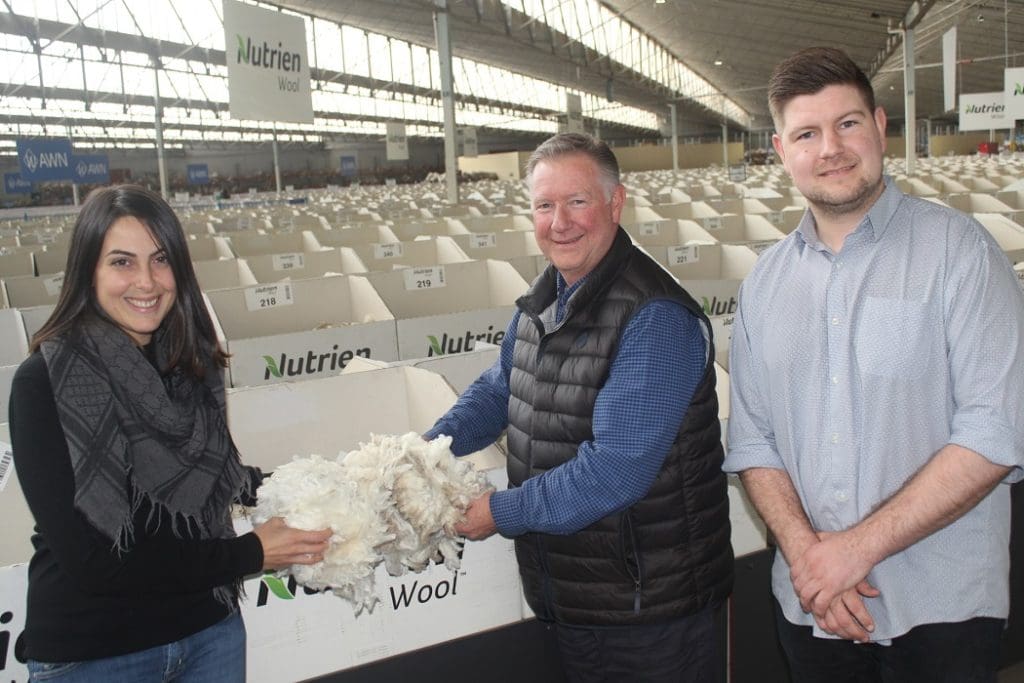
Authentico brand manager Debora Tricarico, G. Schneider Australia wool manager Mark Symes and southern region buyer James Symes inspect some wool in Melbourne.
CLIP certification could help counter the trend from wool production to meat sheep and other land uses due to low livestock prices, according to the Schneider Group’s Authentico brand manager Debora Tricarico.
While on her first visit to Australia and New Zealand last month to promote clip certification, Ms Tricarico said certified growers were able to access better marketing opportunities not available to non-certified growers.
Wool growers certified for non-mulesing, animal welfare and sustainability are also more competitive with wool from other countries where mulesing is banned, she said.
Ms Tricarico said the wool industry needed to show its product to consumers exposed to garments made from fibres created to imitate wool that might be cheaper or perceived as more sustainable.
“So if we improve the sustainability and management of this supply chain at all levels and show and prove that it is certified and that we are doing it right, some people using a man-made fibre substituting wool will go back to wool.”
She agreed widespread certification would improve the social license of the wool industry.
“It’s a good risk management tool – we don’t want to see this industry extinguishing.”
About 1000 Australian growers and 300 in New Zealand are certified under Authentico, but Schneider wants to increase this, while trying to source quality certified wool from other countries. There is potential to grow certified wool volumes via new certifications, but also by already accredited growers accessing contract price premiums by supplying special projects with retailers, she said.
Ms Tricarico’s previous textile roles have been with brands on sustainability along the supply chain, dealing with all the other fibres handled by Schneider. Consistent with the integrated approach of the business, she said promotion of the Authentico integrity scheme must be done from the supplier/growers to the retailers.
Ms Tricarico said completely transparent supply chains are important because certification did not always say where the wool comes from. One objective is to increase the number of Australian growers in Authentico to lift the quantities of responsibly sourced quality traceable wool. But a major focus is to have Authentico perceived for its differences to other schemes, including its reliability and robustness, she said.
While other integrity schemes have had their issues among growers on sheep and farm management aspects, Ms Tricarico said Authentico is grower-friendly because it is free, recognizes quality and sustainability and builds on existing standards, best practices and legislations honoured by wool growers already.
European processors have consistently told Sheep Central they would like to see just one integrity scheme for wool, yet the wool supply chains is crowded with integrity schemes, including Authentico, Responsible Wool Standard and Australia’s SustainaWOOL, which is at the centre of a traceability initiative by Australian exporters, brokers, growers and Australian Wool Innovation and the AWTA.
Ms Tricarico is comfortable with competition between integrity schemes and standards, but she said they must be reliable, robust and transparent about their limitations, and they should co-operate where possible.
Some Authentico growers in Australia are also in a RWS group.
“That proves that we are not competing with RWS.
“Something really good about Authentico is that it doesn’t exclude other schemes, it actually recognizes other schemes, adding some other value, which in our case is that you don’t only know that your wool is responsibly sourced, you also know it is of good quality, because all Authentico wool is non-mulesed, and classed by registered classers.”
Retailers who buy wool from Schneider know the exact farm it comes from, but also how, where and who has processed it, she said.
Ms Tricarico agreed there is more potential to increase quantities of certified wool from Australia, than from other countries, and is looking forward to the time when certification is the norm and all wool is responsibly sourced and environmentally sustainable.
She said certification is not only about non-mulesing, but also about animal welfare, land and pasture management, greenhouse emissions, and social responsibility as elements of sustainability.
“Those are the reasons why certification in today’s environment is needed, because it is not only about mulesing.”
- Schneider Australia wool manager Mark Symes said premiums are very hard to qualify, as there are so many factors that attract enhancement in price such as, non-mulesed and RWS status, micron, vegetable matter content, length and strength, and of course quality.
“But Authentico growers can be confident they are receiving maximum competition on every lot sold in the auction and they are being selected carefully with the intention of committing to the supply chain for fully certified, traceable wool top for our most valued clients,” he said.
Ms Tricarico said certification offers growers the chance to better market their wool by offering more exposure and connection to the rest of the supply chain.
“Because there is interest among the retailers to know more and more about what happens in the supply chain and there is a willingness among growers to know where their wool ends up.”

HAVE YOUR SAY